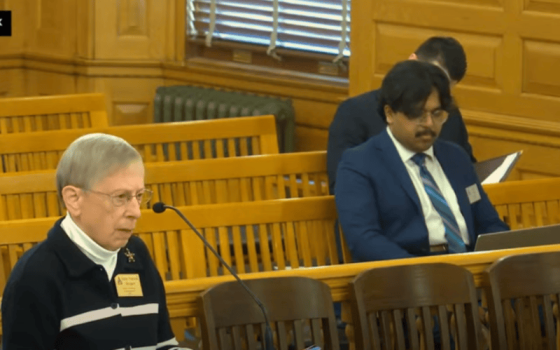Students, faculty, religious leaders and concerned neighbors attended “Is Dreaming Illegal? Seeking Sustainable Solutions”, Dominican University’s immigration forum Tuesday, March 15. Dominican University is a small, Catholic institution with about 4,000 students located in River Forest Illinois.
The evening’s discussion addressed the statistical, legal, theological and ethical aspects of immigration, beginning with the question “Is dreaming illegal?”
The four person comprehensive panel, all with different backgrounds, was co-hosted by the Center for Global Peace through Commerce and the Siena Center.
Claire Noonan, director of the Siena Center provided opening remarks giving context to immigration and the University. “It is a deeply personal issue for all of us at Dominican University, where we pride ourselves in being a relationship-centered place, where the participation in the creation of a much just and humane world is a driving priority.”
Mark Lopez, who is the associate director for the Pew Hispanic Center in Washington D.C., opened the forum presenting facts and statistics, all dealing with what Hispanics think of immigration and other pressing issues. One surprising fact was that the number of foreign born Hispanics in the U.S has gone significantly down.
“Around 12.2 percent of the Hispanic population is foreign born, and there has been a large decline in the illegal immigrant population since 2007,” Lopez said.
The decline in immigrants can be attributed to the economy, Lopez went on to say. “The economy being bad and the construction industry going down as well as the housing industry was a large reason for immigrants to stop coming.”
In immigration, the legal system is not beneficial for immigrants attempting to become legalized, said Rev. Craig Mousin, JD, ombudsperson for DePaul University, who gave the legal perspective on immigration.
Mousin mentioned, for example, that the legal system is set up with priority given to the reunification of families but that the system also makes families wait way too long.
At the end of his presentation, Mousin provided humorous, yet insightful look as to what the Gospel would look like if the immigration laws of today were in place then. For example, Genesis tells us that the Land of Canaan fell into a famine and in the second year of the famine, Jacob sent his sons to Egypt to buy goods. With the immigration laws of today in place, Jacob’s sons would never been allowed into Egypt without having to wait an excessively long time.
The perspective of Catholic social teaching on immigration was addressed by Elizabeth Collier, assistant professor of business ethics at Dominican University. “The church teaches that the human person precedes the state,” Collier said.
Her talk delved into what the church teaches on immigration, a steady stance of human justice and dignity. According to Collier the state and its policies use a “utilitarian calculus” and only worry about how they can benefit from immigrants. In contrast, the Catholic perspective does not aim to profit from immigration, but instead to live in communion, be converted by the relationship and build solidarity.
Elena Segura, the director for the Office of Immigrant Affairs and Immigration Education for the Chicago archdiocese, believes that immigrants are at times dehumanized and that it leaves little room for progress.
Segura works with immigrants and has experienced personally how these immigrants are treated, especially in the process of deportation. “They are caged up in the buses sometimes and you can hardly talk to them,” Segura said.
Segura said that the Catholic Church is tirelessly addressing immigration and attempting to educate Catholics so that immigrants can have advocates and assistance, such as affordable legal representation.
The majority of the event was occupied by the speakers, but at the end there was an opportunity for the audience members to ask questions to the panel. The forum was inspiring and informative and left many with aspirations to help change the immigration climate.
As Dominican Sr. Mary Ann Mueninghoff put it, “the panel was both sobering and inspiring.”
[René Howard-Paez is a sophomore at Dominican University.]



